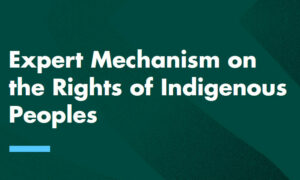Event Body Meeting
16th session of the Expert Mechanism on the Rights of Indigenous Peoples

The 16th session of the Expert Mechanism on the Rights of Indigenous Peoples (EMRIP) takes place from 17 to 21 July 2023. EMRIP is a subsidiary body of the United Nations’ Human Rights Council (HRC), created through HRC resolution 6/36 adopted in 2007, meeting once a year to provide indigenous-based expertise to the Council.
About the Session
The 16th session of the Expert Mechanism on the Rights of Indigenous Peoples (EMRIP) takes place from 17 to 21 July 2023. EMRIP is a subsidiary body of the United Nations’ Human Rights Council (HRC), created through HRC resolution 6/36 adopted in 2007, meeting once a year to provide indigenous-based expertise to the Council.
At this session, the Expert Mechanism will present the Study on the impact of militarization on the rights of Indigenous Peoples, which also highlights the environmental degradation inflicted by militarization. In its advice, the Expert Mechanism mentions that States should refrain from contaminating Indigenous territories with military waste, and should remedy the damage already caused to Indigenous lands and territories, to Indigenous Peoples’ health and to their right to a healthy, clean and sustainable environment, from past polluting activities.
→ Follow the EMRIP meeting and its side events, and find more information on the Docip resource page.
As the environment is tackled in this session, consult here a list of environment-related activities taking place on the sidelines of EMRIP16.
- 18 July 2023 | Indigenous Peoples’ March & Deskaheh Exhibition Launch | Docip & City of Geneva | 18:00 CEST onwards, Place des Nations & Quai Wilson
The @GENetwork is at the #IndigenousPeople’s March! Delegates of Indigenous Peoples who are gathered in #GENeva for the 16th session of #EMRIP will march from Place des Nations to Quai Wilson.
Learn more about the environment and #EMRIP16 ▶️ https://t.co/MqgSRwHsDu pic.twitter.com/uBfCOIRXFQ
— GENeva Environment Network (@GENetwork) July 18, 2023
- 20 July 2023 | Opportunities and Challenges of a HR based approach to Health, Languages, Biodiversity and Climate Change | UNESCO | 8:30 – 9:45 CEST, Room XXIII
Laura Jan Brubacher of @UWaterloo presents a systematic review of studies on Indigenous health, wellbeing and climate change.
The review finds that #climatechange is affecting indigenous knowledge, and intergenerational knowledge, shared practices, and networks. pic.twitter.com/dG52nVtYz5
— GENeva Environment Network (@GENetwork) July 20, 2023
Indigenous Peoples and the Role of Geneva
As defined by the United Nations, Indigenous peoples are inheritors and practitioners of unique cultures and ways of relating to people and the environment. They have retained social, cultural, economic and political characteristics that are distinct from those of the dominant societies in which they live. Despite their cultural differences, indigenous peoples from around the world share common problems related to the protection of their rights as distinct peoples.
Over the past years, environmental negotiations in Geneva and beyond have been referring more and more to Indigenous People and their knowledge, which are at the frontline of the protection of our planet. Learn more about the role of Geneva in the promotion and protection and the rights of Indigenous Peoples in our dedicated update.
Resources
- 16th session of the Expert Mechanism on the Rights of Indigenous Peoples
- Docip at the 16th session of the Expert Mechanism on the Rights of Indigenous Peoples
- Indigenous Peoples and the Role of Geneva
